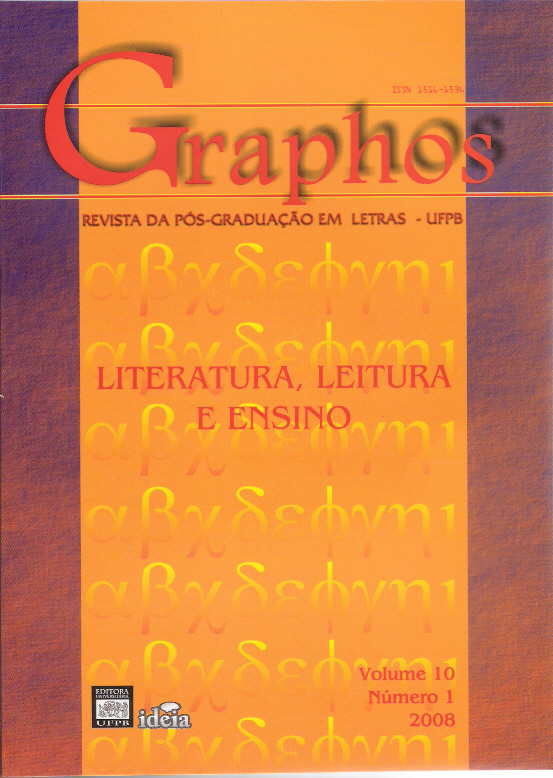A intelectualidade popular em dois romances africanos de língua portuguesa
Keywords:
intellectuallity, critical discourse, popular character, African literature of Portuguese language, raceAbstract
The article aims at analyzing the critical behavior of characters in two African novels written in Portuguese: Régulo Bsum Nanki, of the novel A última tragédia, and Arcanjo Mistura, of the novel O outro pé da sereia. Firstly we consider the way they socially interact so as to eventually analyze the critical discourse they reveal as popular characters. For that purpose, we have mainly drawn from Said’s (1994) and Santos’s (2000) theories. Concerning the racial issue the characters arise, we have concluded that the question may be considered in a different perspective as it transcends the binary oppositions that have usually characterized the racial debates since the colonizing process suffered by the Southern countries. This new approach gets materialized in Arcanjo Mistura’s discourse, which currently resonates Barack Obama’s inaugural address, despite Régulo’s bipolarized emphasis; a fact justified by his being a character belonging to an older historical time. It is relevant to point out that the new focus on the issue appears as a consequence of the emergence of rebellious subjectivities who believe the future may be changed, thus giving life to a more active and ambiguous hope, which may result in present action, aiming to modify what lies in a moment beyond.
Downloads
References
ABDALA Jr., B Fronteiras Múltiplas e Hibridismo Cultural: Novas perspectivas Ibero-afroamericanas. In: _______ De vôos e Ilhas: Literatura e Comunitarismos. São Paulo: Ateliê Editorial, 2003, p.77 a 102.
AUGEL, M. P. A nova literatura da Guiné-Bissau. Bissau: Instituto Nacional de Estudos e Pesquisa da República da Guiné-Bissau, 1998.
AUGEL, M. P. Três faces da nação (prefácio). In: SILA, A. A última tragédia. Rio de Janeiro: Pallas, 2006, p.7 a 20.
COUTO, H. H. do. Crioulo e português na Guiné-Bissau. Revista Humanidades: Consciência Negra. Brasília,, n. 47, nov./dez. 1999, p. 55 a 68.
COUTO, M. O outro pé da sereia. São Paulo: Companhia da Letras, 2006.
GRUZINSKI, S. “Misturas e mestiçagens”. In: ________ O pensamento mestiço. São Paulo: Companhia das Letras, 2001, p.39 a 62.
MABRY, M. Where Whites Draw the Line: How black is too black?. The New York Times. New York, 8 jun 2008. Week in Review, Color Test, 2 p. Disponível em: <http://www.nytimes.com/2008/06/08/weekinreview/08mabry.html?_r=1&ex=1213588800&en=f1 00e0de60121fa2&ei=5070&emc=eta1&oref=slogin> Acesso em: 17 jun. 2008.
OBAMA, B. H. Discurso proferido em 19 de jun 2008, na Filadélfia, Estados Unidos da América - versão fornecida pela direção de sua campanha presidencial, online, 2008. Disponível em:<http://www1.folha.uol.com.br/folha/mundo/ult94u383130.shtml>. Acesso em: 17. jun. 2008.
SAID, E. Representações do intelectual – As conferências de Reich de 1993. Trad. Milton Hatoum, São Paulo: Companhia das Letras, 1994, p.19 a 54.
SANTOS, B. S. Para um novo senso comum: a ciência, o direito e a política na transição paradigmática. São Paulo: Cortez, 2000.
SILA, A. A última tragédia. Bissau: KU SI MON Editora, 1995. Tradução e notas de Alain Canihac e Graziella Neves Forte Canihac.
SILA, A. L’ultime tragédie. Saint-Maur: Editions Sépia, 1995.
SILA, A. A última tragédia. Rio de Janeiro: Pallas, 2006.







